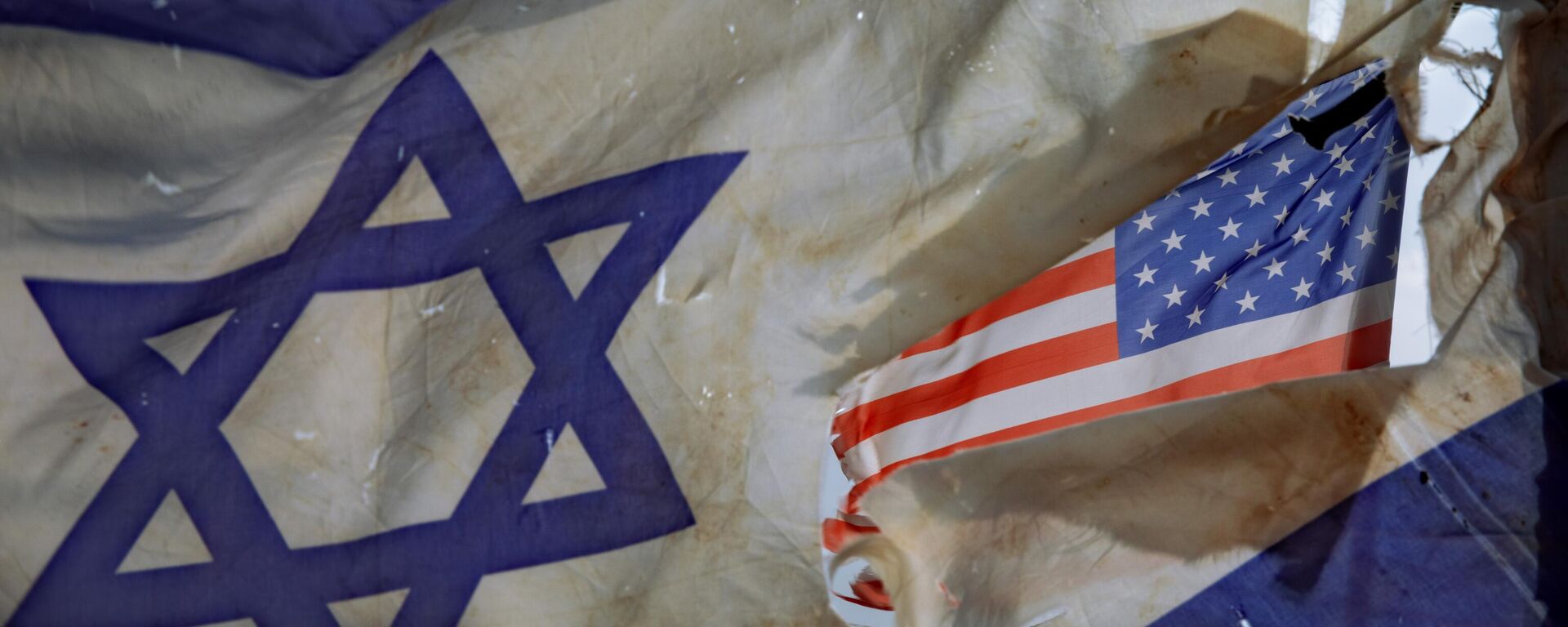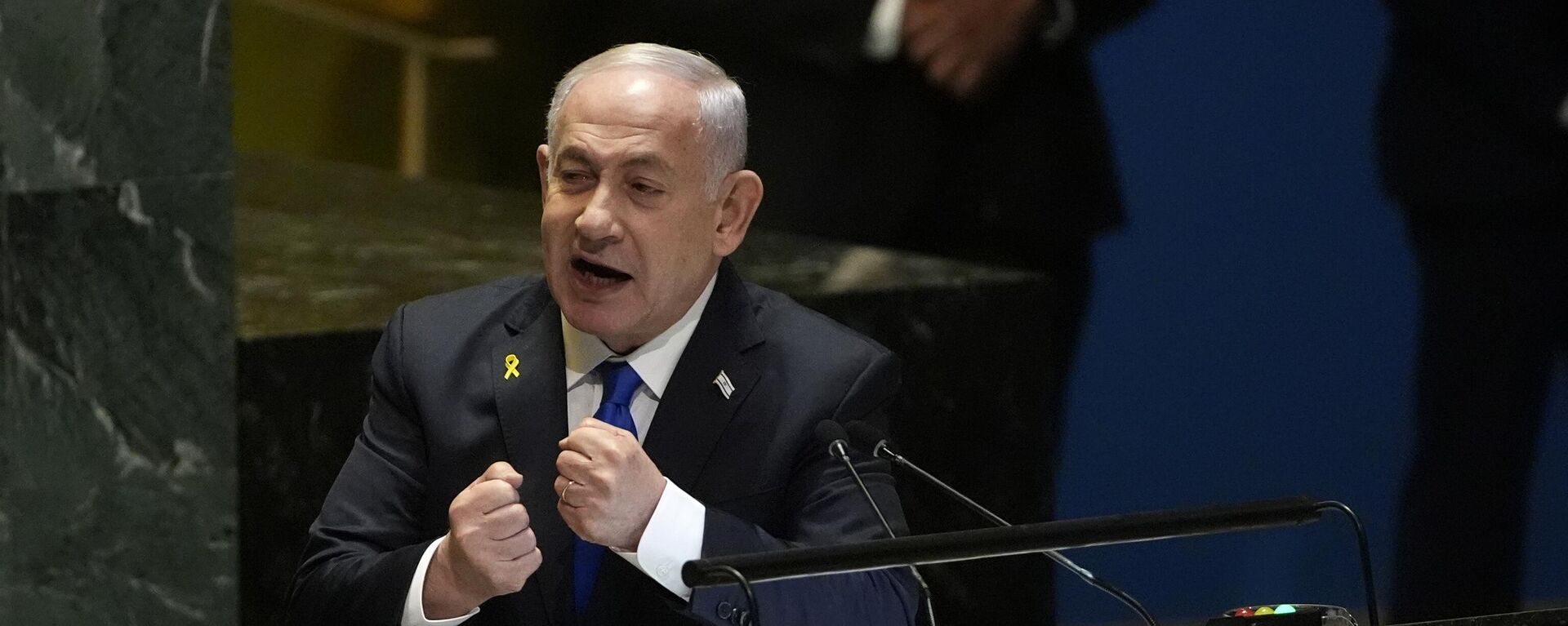https://sputnikglobe.com/20241004/us-speaks-out-of-both-sides-of-its-mouth-us-continues-to-hand-hold-israel-despite-wrongdoings--1120407503.html
'US Speaks Out of Both Sides of Its Mouth': US Continues to Hand-Hold Israel Despite Wrongdoings
'US Speaks Out of Both Sides of Its Mouth': US Continues to Hand-Hold Israel Despite Wrongdoings
Sputnik International
Fault Lines spoke to guests John Kiriakou, a former CIA officer and co-host of Sputnik’s Political Misfits, as well as Michael Maloof, a former senior security policy analyst.
2024-10-04T04:20+0000
2024-10-04T04:20+0000
2024-10-04T04:20+0000
analysis
middle east
michael maloof
john kiriakou
israel
iran
pentagon
iran, north korea, and syria nonproliferation act
cia
genocide
https://cdn1.img.sputnikglobe.com/img/07e8/0a/04/1120408860_0:0:3072:1728_1920x0_80_0_0_b211d4ccfbd94b249f7dd940cbdb152f.jpg
Iran launched at least 180 missiles into Israel on Tuesday as the region has entered a growing escalation that is threatening to push the Middle East into a wider war. Earlier on Tuesday, Israel launched what they claimed to be a limited ground incursion in southern Lebanon, AP reported. The report adds that Israelis “scrambled for bomb shelters as air raid sirens sounded and the orange glow of missiles streaked across the sky," following Iran's missile launch.Sputnik’s Fault Lines spoke to guests John Kiriakou, a former CIA officer and co-host of Sputnik’s Political Misfits, as well as Michael Maloof, a former senior security policy analyst in the Office of the Secretary of Defense, about the broadening conflict in the Middle East.The former CIA officer added that the Iranian government is under “great pressure” from its public to act in the face of Israel's violence, where one has to start thinking about whether or not it’s “safe for the Iranian government" not to respond.Maloof echoed Kiriakou’s analysis, and suggested that Israel would target oil refineries.“And that could, I think the idea is to try to limit Iran's ability to cash, to acquire cash, and, of course, China is very concerned about this right now because that's where they get most of their oil, for the most part, since they're an oil-importing country,” Maloof explained. “If that happens, my worst-case scenario in this case would be that Iran may retaliate by just shutting down the Strait of Hormuz, and that is something that is a possibility. They can do it.”In April, following Iran’s retaliatory strike on Israel, a hacking group linked to Iran claimed to have compromised Israeli radar systems in the weeks leading up to their strike, a report published by Foreign Policy claimed. However, the two countries have had an ongoing “cyber battle” for more than a decade.The report claims that as early as 2006, the US and Israel began developing and then deploying Stuxnet; a cyberweapon made to infiltrate and sabotage the computer system at Iran’s Natanz nuclear facility. Both Israel and the US have denied creating the malware, the report notes, yet multiple independent news organizations agree that they are behind the software. This likely instigated Iran to retaliate with its own cyber program which the US government considers to be one of its “top threats”, the report notes.“I would call Israel a cyber superpower and Iran a rising cyber power,” said Mohammed Soliman, the director of the strategic technologies and cybersecurity program at the Middle East Institute in Washington, D.C. “Iran is not really equivalent to Israel in cyberspace, but they are a very agile nation in terms of building their own capabilities, and they have been also learning from the Israelis all these years.”“There were 40,000 troops already in the region. We sent three dozen advisers to Cyprus to accompany thousands of British troops that are being sent,” Kiriakou continued. “It's my experience from the CIA that if you are really going to have hostilities, you'll be tipped off by the movement of naval assets,” Kiriakou said.On Monday, the Pentagon announced that US President Joe Biden would be sending a “few thousand” more troops to the Middle East in the face of growing tensions between Hezbollah and Israel, the New York Times reported. The Pentagon did not say exactly how many troops were to be deployed, but one official put the estimate between 2,000 and 3,000. A reported 40,000 American troops are already stationed on bases in Iraq, Syria and other countries.Maloof told Sputnik that while he doesn’t see “US boots on the ground”, he does think the US will “welcome” the destruction of infrastructure.“I think the US will welcome destroying the infrastructure and then hope for the people to rise up. I think that's the - I don't see US boots on the ground, personally. But I do see [...] an air campaign, missiles, and, but no boots on the ground,” Maloof said.Hurricane Helene brought widespread destruction to the US since it first made landfall in Florida a week ago. At least 215 people in the US are believed to be dead as a result of the intense storm. In May, NOAA National Weather Service forecasters at the Climate Prediction Center predicted above-normal hurricane activity in the Atlantic basin this year. Despite their prediction, Homeland Security Secretary Alejandro Mayorkas announced this week that the Federal Emergency Management Agency (FEMA) will not have enough funds to last the rest of the hurricane season.Yet, just a week ago, Israel announced that it had secured an $8.7 billion aid package from the US to support its military goals.
https://sputnikglobe.com/20241004/originally-an-outgrowth-of-european-colonialism-israel-now-threatens-wests-dominance-1120407159.html
https://sputnikglobe.com/20241003/new-day-for-world-as-myth-of-israeli-invincibility-shattered--analyst-1120392188.html
https://sputnikglobe.com/20241002/netanyahu-seeks-to-drag-us-into-war-with-iran--ex-italian-diplomat-1120385261.html
israel
iran
Sputnik International
feedback@sputniknews.com
+74956456601
MIA „Rossiya Segodnya“
2024
News
en_EN
Sputnik International
feedback@sputniknews.com
+74956456601
MIA „Rossiya Segodnya“
Sputnik International
feedback@sputniknews.com
+74956456601
MIA „Rossiya Segodnya“
zionism, american zionists, us zionists, zionist alliance, us-israel alliance, war crimes, genocide, us hegemony, hezbollah, hezbollah, shia movement, israel-lebanon war, lebanon-israel war, israeli-shia war, israel-hezbollah war, hezbollah-israel war, hezbollah-israel crisis, hezbollah-israel strikes, israeli strikes, ethnic cleansing, gaza war, hamas-israel war, war crimes, arrows of the north, northern arrows, arrows of north, israeli offensive, israeli ground offensive
zionism, american zionists, us zionists, zionist alliance, us-israel alliance, war crimes, genocide, us hegemony, hezbollah, hezbollah, shia movement, israel-lebanon war, lebanon-israel war, israeli-shia war, israel-hezbollah war, hezbollah-israel war, hezbollah-israel crisis, hezbollah-israel strikes, israeli strikes, ethnic cleansing, gaza war, hamas-israel war, war crimes, arrows of the north, northern arrows, arrows of north, israeli offensive, israeli ground offensive
'US Speaks Out of Both Sides of Its Mouth': US Continues to Hand-Hold Israel Despite Wrongdoings
Israeli Prime Minister Benjamin Netanyahu vowed late on Tuesday that the state would retaliate against Iran. And General Mohammad Bagheri, Iran’s armed forces joint chief of staff, cautioned that Iran would respond by striking on Israel’s entire infrastructure with “multiplied intensity”. A cease in the conflict, therefore, seems highly unlikely.
Iran launched at least 180 missiles into Israel on Tuesday as the region has entered a growing escalation that is threatening to push the Middle East into a wider war. Earlier on Tuesday, Israel launched what they claimed to be a limited ground incursion in southern Lebanon, AP reported. The report adds that Israelis “scrambled for bomb shelters as air raid sirens sounded and the orange glow of missiles streaked across the sky," following Iran's missile launch. Sputnik’s Fault Lines spoke to guests John Kiriakou, a former CIA officer and co-host of Sputnik’s Political Misfits, as well as Michael Maloof, a former senior security policy analyst in the Office of the Secretary of Defense, about the broadening conflict in the Middle East. “I think that the strategy on the part of the Israelis for the past many months has been to try to draw the US more directly into the conflict on Israel's side. [President Masoud] Pezeshkian and the Iranian government have shown great restraint. Great restraint in the face of direct attacks from the Israelis,” Kiriakou explained.
The former CIA officer added that the Iranian government is under “great pressure” from its public to act in the face of Israel's violence, where one has to start thinking about whether or not it’s “safe for the Iranian government" not to respond.
“I don't think that the Israelis can handle a five-front war. And I think that they'll end up bombing Iran. My guess is it'll probably be bombing of military sites and nuclear sites, not the oil fields. That would be economic terrorism. I mean, the Israelis are perfectly happy to commit terrorism, but I think they'd get more bang for their buck hitting military and nuclear sites. But, in terms of, like, fighting fighting, they get nothing out of that,” Kiriakou explained.
Maloof echoed Kiriakou’s analysis, and suggested that Israel would target oil refineries.
“I think there will be a response. They have followed through every time,” Maloof said of Israel. “So, and it'll probably come in one degree or another in terms of intensity. I don't think the nuclear sites will be initially done. My sense, I guess, would be the oil refineries.”
“And that could, I think the idea is to try to limit Iran's ability to cash, to acquire cash, and, of course, China is very concerned about this right now because that's where they get most of their oil, for the most part, since they're an oil-importing country,” Maloof explained. “If that happens, my worst-case scenario in this case would be that Iran may retaliate by just shutting down the Strait of Hormuz, and that is something that is a possibility. They can do it.”
“And that will really disrupt traffic. And coordinated that 2006, with the Ansar Allah group, the Houthis as they're called, and cut off the Red Sea access as well. So, this could be devastating to international trade and commerce and really create, perhaps, a world recession,” he added. “...there could even be a cyber attack that could be forthcoming. So it could be an asymmetric type of response on many levels. But, we just don't know what they plan.”

4 October 2024, 03:35 GMT
In April, following Iran’s retaliatory strike on Israel, a hacking group linked to Iran claimed to have compromised Israeli radar systems in the weeks leading up to their strike, a report published by Foreign Policy claimed. However, the two countries have had an ongoing “cyber battle” for more than a decade. The report claims that as early as 2006, the US and Israel began developing and then deploying Stuxnet; a cyberweapon made to infiltrate and sabotage the computer system at Iran’s Natanz nuclear facility. Both Israel and the US have denied creating the malware, the report notes, yet multiple independent news organizations agree that they are behind the software. This likely instigated Iran to retaliate with its own cyber program which the US government considers to be one of its “top threats”, the report notes.
“I would call Israel a cyber superpower and Iran a rising cyber power,” said Mohammed Soliman, the director of the strategic technologies and cybersecurity program at the Middle East Institute in Washington, D.C. “Iran is not really equivalent to Israel in cyberspace, but they are a very agile nation in terms of building their own capabilities, and they have been also learning from the Israelis all these years.”
“...what's the role of the United States in this? And, I think that 32 days before a presidential election, the Democrats need an October surprise like they need a hole in the head. Nobody wants to be dragged into a Middle Eastern war that could go on for 20 years, that's already gone on since, you know, 1948,” Kiriakou explained. “The price of oil is going to instantly go up over $100 a barrel. And that's gonna cause an oil shock in the United States right before the election.”
“There were 40,000 troops already in the region. We sent three dozen advisers to Cyprus to accompany thousands of British troops that are being sent,” Kiriakou continued. “It's my experience from the CIA that if you are really going to have hostilities, you'll be tipped off by the movement of naval assets,” Kiriakou said.
“We have a carrier battle group in the Eastern Mediterranean. We have a carrier battle group in the Arabian Sea. If we start sending additional carrier battle groups, moving them from the Pacific or the South China Sea into the Persian Gulf, the Mediterranean, or the Arabian Gulf, then we're headed for trouble,” he added.

3 October 2024, 02:27 GMT
On Monday, the Pentagon announced that US President Joe Biden would be sending a “few thousand” more troops to the Middle East in the face of growing tensions between Hezbollah and Israel, the New York Times reported. The Pentagon did not say exactly how many troops were to be deployed, but one official put the estimate between 2,000 and 3,000. A reported 40,000 American troops are already stationed on bases in Iraq, Syria and other countries. Maloof told Sputnik that while he doesn’t see “US boots on the ground”, he does think the US will “welcome” the destruction of infrastructure.
“I think the US will welcome destroying the infrastructure and then hope for the people to rise up. I think that's the - I don't see US boots on the ground, personally. But I do see [...] an air campaign, missiles, and, but no boots on the ground,” Maloof said.
“Let's be clear, [the US] speak out of both ends of their mouth. The US says it wants a ceasefire, but, on the other hand, it continues providing the assistance and backing, and with other claims made by US officials that they will back Israel should it go into Lebanon,” Maloof explained. “The Israelis are ignoring all cautionaries from the US, and they know that the United States will do nothing.”
“Who's gonna stop Netanyahu? At this point he feels he has the mandate to do it and he doesn't care. He's actually set all the new rules for warfare now. He has disregarded all international norms, even war crimes, he’s committing war crimes, bombing indiscriminately civilian areas, particularly in Beirut. Beirut was hit again this morning. The central part of Beirut, the city. That city will never be the same,” Maloof explained.

2 October 2024, 12:06 GMT
Hurricane Helene brought widespread destruction to the US since it first made landfall in Florida a week ago. At least 215 people in the US are believed to be dead as a result of the intense storm. In May, NOAA National Weather Service forecasters at the Climate Prediction Center predicted above-normal hurricane activity in the Atlantic basin this year. Despite their prediction, Homeland Security Secretary Alejandro Mayorkas announced this week that the Federal Emergency Management Agency (FEMA) will not have enough funds to last the rest of the hurricane season. Yet, just a week ago, Israel announced that it had secured an $8.7 billion aid package from the US to support its military goals. “[The US is] not providing anything for our own crises right now from this hurricane that just hit, let alone try to provide assistance to these other countries. I think everything is overwhelming the system, our own system on how to deal with all these crises, all coming at us all at once. And that's what I think is affecting this administration,” Maloof noted. “They've become paralyzed in terms of action on what to do. What are the priorities at this point?”





